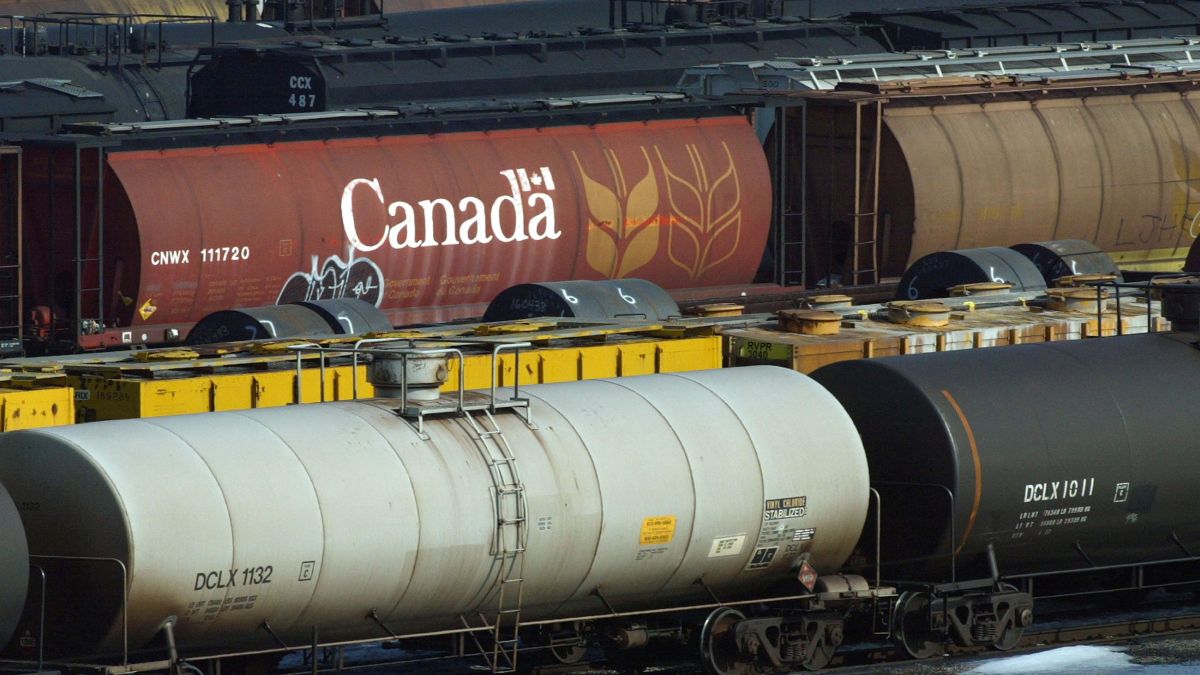Canada’s two largest rail companies — Canadian National Railway (CN) and Canadian Pacific Kansas City (CPKC) — are locked in a battle with the Teamsters Canada Rail Conference union over contract negotiations. The three parties are unable to arrive at any compromise, which has led to fears of a strike on August 22 read more
)
A wheat railcar sits at a Canadian National Railway (CN) yard in Hamilton, Ontario. A strike looms large in Canada, which could cause billions of dollars' worth of economic damage. File image/Reuters
On August 22 (Thursday), Canada’s two largest railway companies — Canadian National Railway (CN) and Canadian Pacific Kansas City (CPKC) — may go off track, as they are locked in a labour dispute with the Teamsters union. If talks don’t hold, the union may go on strike, which could cause billions of dollars’ worth of economic damage.
In a statement, the Teamsters Canada Rail Conference, which represents some 9,300 engineers, conductors, yard workers and rail traffic controllers, said: “Unless parties reach last-minute agreements, a work stoppage will occur at 00:01 on Thursday, August 22.”
What’s going on? What’s the dispute all about? Could a possible strike affect supply chains? We have the answers.
Why are both rail companies on the verge to stop?
News agency Reuters reports that contract talks between the Teamsters union and the companies take place a year apart. However, in 2022, after the federal government introduced new rules on fatigue, CN requested a year-long extension to its existing deal rather than negotiate a new one.
This has led to both companies’ labour agreements to expire at the end of 2023. However, the two rail companies and the union are unable to arrive at a feasible conclusion, which could halt the majority of the Canadian freight rail system.
The companies and the union accuse each other of bad faith during the talks. The Teamsters say CN Rail and CPKC are seeking concessions that could endanger worker safety, a charge both the operators deny.
“From the very beginning, rail workers have only ever sought a fair and equitable agreement. Unfortunately, both rail companies are demanding concessions that could tear families apart or jeopardise rail safety,” said Teamsters president Paul Boucher in a statement as per a report in Global News.
As per the union, CPKC wants “to gut the collective agreement of all safety-critical fatigue provisions”. The CPKC, according to the union, wants to keep crews awake for longer hours, boosting the risk of accidents.
CPKC, however, says its offer maintains the status quo for all work rules, “fully complies with new regulatory requirements for rest and does not in any way compromise safety”.
On the other hand, the union notes that CN’s offer would lead to workers being ordered to move across Canada for months at a time to fill labour shortages. But CN notes that its deal fully compliant with government-mandated rules overseeing duty and rest periods.
What happens next?
If the involved parties involved can’t reach a deal, Canada will see a goods train strike, which will impact supply chains and causes losses worth millions of dollars.
Barry Prentice, director of the transport institute at the University of Manitoba’s Asper School of Business, said farmers in the Prairies would be impacted. Jill Verwey, president of Keystone Agricultural Producers (KAP), also held the same opinion, telling 680 CJOB’s The Jim Toth Show that the timing of the potential strike isn’t good for farmers.
“With producers going to the field currently for some of the spring crops, and as we head into the harvest season, it puts a real strain on our handling facilities and being able to make sure that we get our crop to port in time to meet those deadlines,” Verwey was quoted as saying by Global News.
Already, both rail operators have begun to refuse certain cross-border cargoes. For instance, Fertilizer Canada said the threat of work stoppages has already started to impact the movement of fertilizers and added that they are expecting further embargoes and slowdowns in rail services.
A report by supplychaindive.com noted that more than 900,000 metric tonnes of goods move daily on Canada’s railways and a work stoppage would impact the movement of $1 billion in goods daily.
Scott Shannon, vice president with CH Robinson Worldwide’s North American Transportation Division, noted: “If workers at both railroads strike, it could paralyse the ports and trucking rates could spike because a whole lot of freight would have to find another way to travel.”
Can the federal government stop the strike?
Under Article 107 of the federal labour code, Labour Minister Steven MacKinnon has broad powers and can order the sides to enter binding arbitration. In 2023, his predecessor, Seamus O’Regan, issued such an order to end a dockworkers strike in British Columbia. In that case, unlike the current rail dispute, the sides had largely agreed on the outlines of a deal.
However, MacKinnon rejected a request last week by CN for binding arbitration, urging the sides instead to put in more effort at the negotiating table.
The current Liberal government has shown little interest in such a move in past disputes, preferring the sides to focus on negotiations. A complicating factor is that Prime Minister Justin Trudeau’s government is being kept in power by the left-leaning New Democrats, who have traditionally enjoyed strong union support.
With inputs from Reuters

 1 month ago
51
1 month ago
51
)
)
)
)
)
)
)
)
)
)
)
)
)
)
)
)
)
)
)
)
)
)
)
)
)
 English (US) ·
English (US) ·